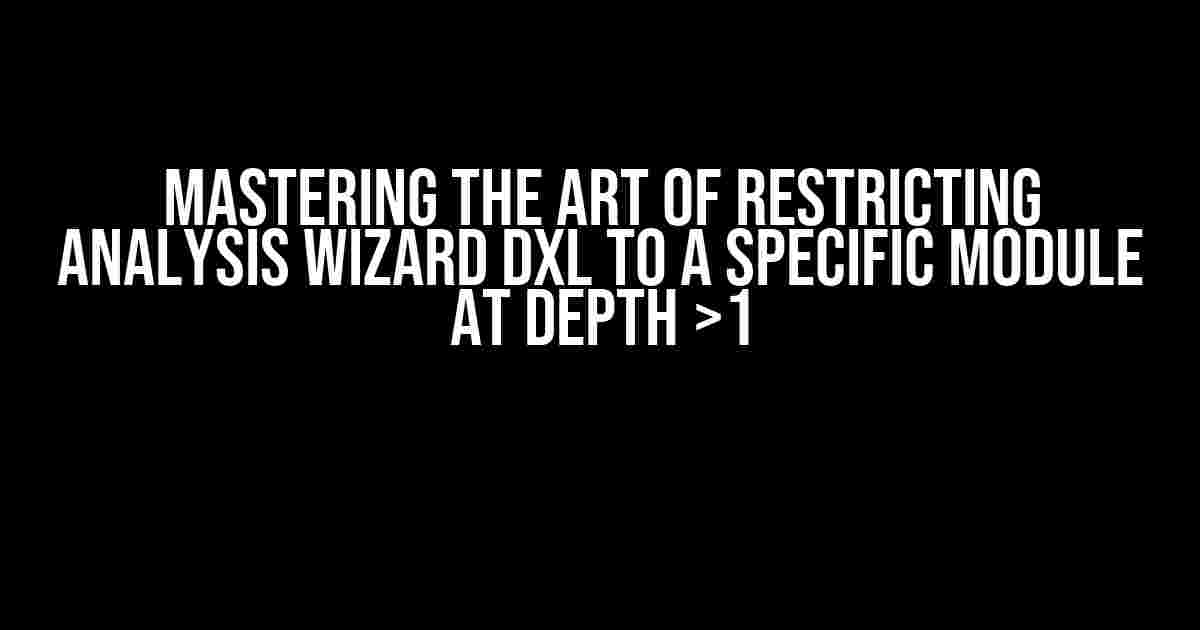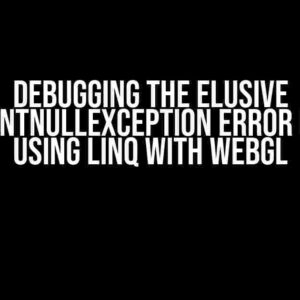Are you tired of dealing with the complexity of Analysis Wizard DXL and struggling to restrict its functionality to a specific module at a depth greater than 1? Look no further! In this comprehensive guide, we’ll take you by the hand and walk you through the step-by-step process of achieving this feat. Buckle up, folks, and let’s dive in!
What is Analysis Wizard DXL?
Before we dive into the nitty-gritty of restricting Analysis Wizard DXL, let’s take a brief moment to understand what it is. Analysis Wizard DXL is a powerful tool used in IBM Rational ClearQuest to analyze and report on data. It’s like a superhero sidekick that helps you make sense of your data and identify trends, patterns, and insights that can inform your business decisions.
Why Restrict Analysis Wizard DXL to a Specific Module?
So, why would you want to restrict Analysis Wizard DXL to a specific module at a depth greater than 1? Well, there are several reasons:
-
Security: By restricting access to specific modules, you can ensure that sensitive data is protected and only accessible to authorized personnel.
-
Performance: Limiting the scope of Analysis Wizard DXL can improve performance and reduce the load on your system.
-
Usability: By focusing on specific modules, you can simplify the user experience and make it easier for users to find the data they need.
Step-by-Step Guide to Restricting Analysis Wizard DXL
Now that we’ve covered the why, let’s get to the how. Follow these steps to restrict Analysis Wizard DXL to a specific module at a depth greater than 1:
Step 1: Create a New DXL Script
Open your favorite text editor and create a new DXL script. Yes, you read that right – a text editor! DXL scripts are plain text files with a .dxl extension. You can use any text editor you like, but we recommend using an editor with syntax highlighting to make your life easier.
// Create a new DXL script
database db = database "<database_name>";
Step 2: Define the Module
Next, define the specific module you want to restrict Analysis Wizard DXL to. You can do this using the module keyword followed by the name of the module:
// Define the module
module myModule = module "<module_name>";
Step 3: Set the Depth
Now, set the depth to a value greater than 1 using the depth keyword. This will restrict Analysis Wizard DXL to the specified module at the specified depth:
// Set the depth
depth = 2;
Step 4: Restrict the Analysis Wizard
The final step is to restrict the Analysis Wizard to the specified module at the specified depth. You can do this using the restrict keyword:
// Restrict the Analysis Wizard
restrict analysisWizard = analysisWizard(myModule, depth);
Putting it all Together
Here’s the complete DXL script:
database db = database "<database_name>";
module myModule = module "<module_name>";
depth = 2;
restrict analysisWizard = analysisWizard(myModule, depth);
Troubleshooting Common Issues
Like any complex system, Analysis Wizard DXL can be finicky at times. Here are some common issues you might encounter and how to troubleshoot them:
| Error Message | Solution |
|---|---|
| Invalid module name | Check that the module name is correct and exists in the database. |
| Depth value too low | Ensure that the depth value is greater than 1. |
| Analysis Wizard not restricted | Verify that the DXL script is correct and that the restrict keyword is used correctly. |
Conclusion
And there you have it! With these simple steps, you’ve successfully restricted Analysis Wizard DXL to a specific module at a depth greater than 1. Remember to save your DXL script and upload it to your IBM Rational ClearQuest instance to start reaping the benefits of a more secure, performant, and user-friendly Analysis Wizard DXL.
Happy scripting, and don’t hesitate to reach out if you have any questions or need further assistance!
Additional Resources
For more information on Analysis Wizard DXL and DXL scripting, check out the following resources:
-
IBM Rational ClearQuest Documentation: DXL Scripting Reference
-
IBM Developer Community: DXL Scripting Basics
Stay tuned for more tutorials, guides, and articles on mastering Analysis Wizard DXL and DXL scripting!
Frequently Asked Question
Got questions about restricting analysis wizard DXL to specific modules at depth >1? We’ve got the answers!
How do I restrict the Analysis Wizard DXL to a specific module at depth >1?
You can restrict the Analysis Wizard DXL to a specific module at depth >1 by using the `-module` flag followed by the module name and path. For example, `-module “MyModule/SubModule”` would restrict the analysis to the `SubModule` within the `MyModule` module.
What is the syntax for specifying the module path in the `-module` flag?
The syntax for specifying the module path in the `-module` flag is similar to a file system path. Use forward slashes (`/`) to separate module names, and enclose the entire path in quotes. For example, `-module “MyModule/SubModule/InnerModule”` would specify the `InnerModule` within the `SubModule` within the `MyModule` module.
Can I specify multiple modules at different depths using the `-module` flag?
Yes, you can specify multiple modules at different depths using the `-module` flag. Simply separate each module path with a comma (`,`). For example, `-module “MyModule/SubModule”, “MyOtherModule/InnerModule”` would restrict the analysis to both the `SubModule` within the `MyModule` module and the `InnerModule` within the `MyOtherModule` module.
What happens if I specify a module that does not exist at the specified depth?
If you specify a module that does not exist at the specified depth, the Analysis Wizard DXL will simply ignore the restriction and analyze the entire project. To avoid this, make sure to verify the existence of the module at the specified depth before running the analysis.
Can I use wildcards in the module path to restrict the analysis to multiple modules at once?
Yes, you can use wildcards (`*`) in the module path to restrict the analysis to multiple modules at once. For example, `-module “MyModule/*”` would restrict the analysis to all modules within the `MyModule` module. Note that the wildcard only applies to the immediate child modules, not to grandchild modules or deeper.


